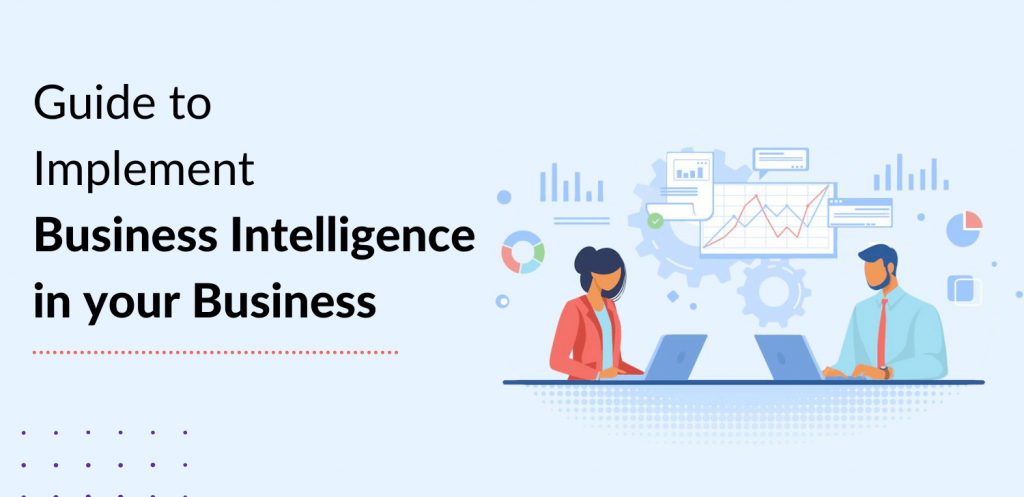
Technological evolution has delivered extreme results to businesses all around the world. Business intelligence implementation helps businesses in streamlining the data and extracting key insights. In the current times, the majority of the companies have a way of working that consists of heavy use of next-gen technologies and cloud solutions. Thus, getting all the processes in control is essential to derive extreme results.
In recent times, it has been perceived that acquiring a decent business intelligence solution is enough to get good results, but that’s not the case. Successful business intelligence implementation is a vital part that delivers you the expected results. Many think that business intelligence implementation methodology is a process that involves tools and technology. Yes, it does, but the main point here is that it’s a strategic vision to bring a company’s data sets together and make the most out of it in terms of intelligent insights.
In this blog, you will learn about the business intelligence implementation and more parameters associated with the said topic.
Let’s begin.
About Business Intelligence
Hans Peter Luhn, a researcher of IBM, is known as the father of business intelligence. The term was first coined in 1958. Let’s understand it from a business point of view. Business intelligence comprises tools that enable you to derive value from your data, such as dashboards or reports.
In most cases, business intelligence tools provide reliable and current data to enable informed navigation and expectation improvement. The business intelligence industry works quickly to keep up with the pace of change and requests from its clients. Indeed, many businesses claim that cloud business information is fundamental to present and future systems.

Business intelligence is effectively put in use to execute a strategy that helps in acquiring more value from your data. And even though this may appear tricky, business expertise isn’t reserved for large corporations with large IT budgets.
Business intelligence is used to democratize information and get the most value out of it, regardless of measurement. Organizations can use business intelligence innovation to survey current and archived data to gain valuable experience and conduct foresight research for future business actions.
Why Implement Business Intelligence?
The global market of business intelligence solutions is progressing immensely. It is forecasted to cross the valuation of 43.03 billion USD by 2028. This figure depicts the success and the rate of adoption of these strategies by various businesses. The most important function of business intelligence is to assist corporate leaders, business chiefs, and other functional heads in making better data-driven business decisions. Many organizations use business intelligence to decrease costs, identify better business opportunities, and identify unnecessary business procedures.
BI strategy also helps in sorting the productive data from a pile. Let’s visualize the concept; it’s a fact that more than seventy percent of the global data is a product of the last few years. It becomes difficult to get only the relevant data that contributes to effective decision-making with so much information. Business intelligence strategies significantly enhance productivity by helping companies analyze the workflow quickly, monitoring the market trends, and more.
 What are the Benefits of Implementing Business Intelligence Technology in Business?
What are the Benefits of Implementing Business Intelligence Technology in Business?
- Intelligent Decision Making: Business Intelligence helps precisely measure business operations and gain a better understanding of internal association processes. It enables group pioneers to assess worker effectiveness and the overall success of a single office.
- Enhanced Data Collection: Information mining is one of the main advantages of business intelligence tools. Some business intelligence tools can complete these cycles on their own. In contrast, others require the assistance of various data storage stages, business investigation apparatuses, and Big Data arrangements.
- Effective Marketing Campaigns: Organizations can also use Business Intelligence to target, adapt, and make better-informed decisions about their marketing activities. Companies can compile and analyze data from their previous online marketing efforts, in-store purchase history, and website activity to get a detailed picture of their customers.
- Better Analytics: BI technologies and tools continuously screen a large amount of data produced by an organization. It carefully studies it for long-term measurements, such as competency, marketing estimates, and boosting costs associated with the business.
- Enhanced Operational Efficiency: Business intelligence solutions connect different data sources to help a firm’s entire hierarchy. It allows supervisors and representatives to deliver precise and convenient reports rather than searching for data.
How to Implement Business Intelligence Services?
Business Intelligence implementation methodology can strike you a bit confusing initially. But once you understand its capabilities, it will be like owning the power ring from Green Lantern. Your data will act as its power source, and your organization can make immense progress with all those powerful insights.

Occam’s Razor suggests the simplest solution is the right and effective one; that’s precisely what a successful Business Intelligence implementation methodology will do for your enterprise. Let’s understand, in brief, the process of implementing this most effective strategy.
-
Analyze Your Current Situation
Getting to know your current condition is the first and most important step of implementing business intelligence solutions. You should deeply analyze your business’s state and the vision you want to achieve through this methodology.
Business Intelligence will provide you with three essential tools; machine learning, predictive analysis, and descriptive analysis. These tools and technologies will help you understand the why and how of the process.
-
Create an Effective Plan
Now that you know exactly where you are and where you want to take your business, it’s essential to give that data the shape of a plan. It is recommended to mark the milestones and the timeline for a better implementation.
The plan should describe each milestone of the process and the variable factors such as your budget, the development partner, market trends, and more.
-
Bring the Team in the Loop
Once you are ready with the perfect plan, it’s more than wise to let your team know about the process. It’s also recommended to indulge your stakeholders and other concerned business individuals. Ensuring everyone is on the same level in terms of opinions will deliver your extreme business advantages.
-
Define the Tools & Technologies
Defining the tools and technologies can be considered an essential part of the business intelligence implementation plan. Eventually, the selected devices will be responsible for the entire insight management of your workflow and operational process. It is recommended to conduct detailed market research about the same.
Market analysis will deliver deep insights about the tools and technologies prevailing on the top, such as Google Data Studio, PowerBI, Looker, and more. Suppose you are not sure what tools will best suit your business goals. In that case, it’s better to ask your business intelligence implementation service provider for effective results. -
Constant Review
After implementing the solution, it’s essential to review the performance and the entire team’s understanding. A business should conduct a detailed review to assess the use of Business Intelligence tools and their outcomes. Any that are no longer in use should be withdrawn consistently. This is essential for an organization’s overall natural development to maintain proficiency, cost-viability, and efficiency.
Common Challenges in Business Intelligence Implementation
When you start something new, it’s more than natural to run into obstacles. Implementing business intelligence solutions into your business is no different. However, these challenges can be easily solved with the help of a reliable business intelligence implementation service provider. Let’s learn the most common challenges businesses face while implementing a business intelligence solution.
- Irregular Data Sets
It’s crucial to understand the material to address accessibility and information evaluation concerns. Currently, corporate insight frameworks and developments need the information to be well categorized to reduce time in accessing and evaluating data. Adding metadata to settings should allow for this sorting. - Building a Poor Roadmap
Developing a solution for your business includes many variables, such as budget. It should be kept in check with proper planning based on the market insights to avoid disturbance. Business insight is sometimes treated as a series of efforts rather than a fluid relationship by organizations. - Poor communication Between Teams
Project completion might be limited by the availability of communication between end clients and IT departments. The requirements of the group of end clients should be aligned with the requirements of IT and purchasers. If they don’t work together, the end output may not match the assumptions and needs, resulting in disappointment from all parties involved and a failed project. Practical actions provide essential tools to corporate clients while meeting internal IT requirements. - Inefficient Adoption
Many Business Intelligence projects attempt to replace previous devices and instruments completely. However, this frequently results in poor customer response, with clients returning to the devices and cycles they are comfortable with. Many experts believe that Business Intelligence initiatives fail due to the time it takes to create or execute reports. It makes clients less willing to adopt new technologies and more likely to revert to legacy instruments.
How can Matellio Help with Your Business Intelligence Implementation?
The future of IT services is full of immense possibilities and challenges. In order to tackle those challenges, Business Intelligence solutions are necessary. With Matellio, you will get a full-fledged development team with state-of-the-art infrastructure. Our team of developers and experts are well aware of the current market trends to develop a solution that perfectly fits your business.
Our shortest turnaround time and the quality of the products make us the best fit for your business intelligence solution development. As a reliable software and mobile app development company, we understand that budget is the main concern for many. However, with our efficient and flexible hiring models, you can easily keep your budget in check.
Get in touch with our experts over a 30-min free consultation call to discuss in detail.





